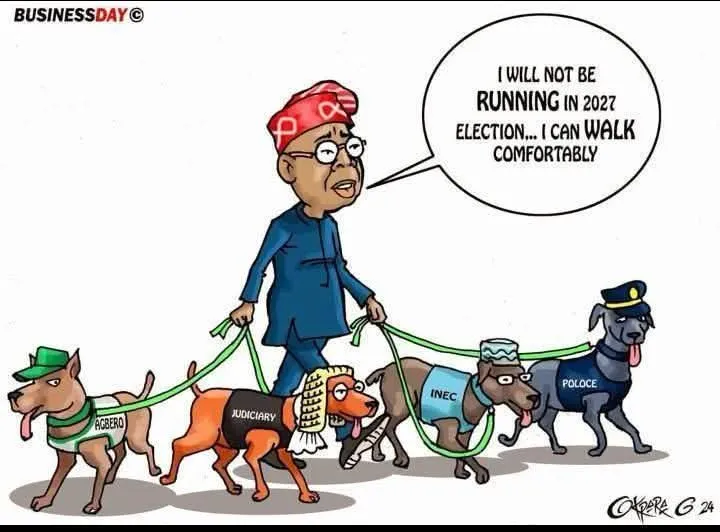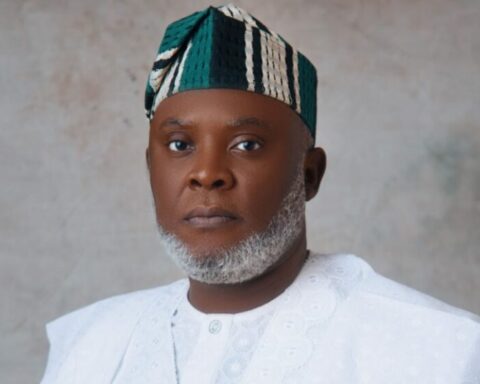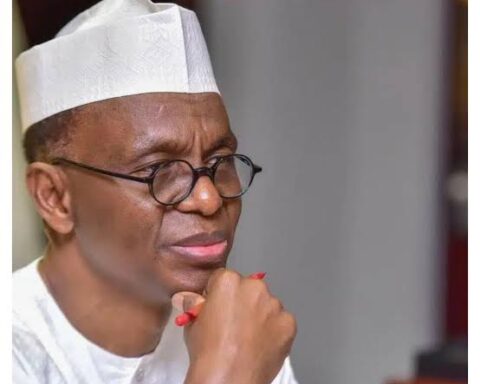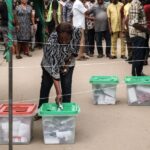By Agbeze Ireke Kalu Onuma, AI-KO
The satirical Illustration below published in BusinessDay struck me immediately—not just for its visual flair, but for its ruthless clarity. In a single tableau, it laid bare the absurdities of Nigeria’s political machinery, where power postures in embroidered finery even as it answers to unseen hands behind the curtain. At the center of this drama stands a character I can only call “Tinubusque”—a figure modeled in the image of leadership, wrapped in flowing agbada, unhurried in movement, yet commanding in presence. With dry wit and an expression of supreme confidence, he announces, “I will not be running in 2027… I can walk comfortably.” It’s a clever quip, clearly meant to impress. But its irony hangs thick in the air, echoing back to 1999—the dawn of civilian rule, when we naïvely believed the age of military overlords had ended, only to watch as the same authoritarian impulse resurfaced in softer, more stylish disguises.
That confident gait, that smug detachment—it reminded me of imperial courts long past, where emperors ruled through intermediaries and kept a calculated distance from the governed. Colonial administrators too had once relied on proxies, cultivating local elites who upheld their rule without dirtying imperial hands. And here, in the parody offered by the cartoon, I saw that same aloofness repackaged—this time not as governance, but as spectacle geared towards the rigging of the next elections.
Trailing close behind the lead figure were five beasts, each straining against its leash. They were not animals in the literal sense, but vivid stand-ins for the country’s battered institutions. The first was the “Agbero,” that infamous street enforcer whose name conjures chaotic memories from Nigeria’s political past—of 1983’s infamous “Wild Wild West” elections, where thugs wielding machetes terrorized polling stations, or of 2007, when youth gangs, dressed like regular guys, quietly became the machinery of ballot fraud. Each of us remember hearing stories from friends who had to flee their polling units; the fear was palpable, the violence indiscriminate.
Beside the Agbero paced the “Judiciary,” wearing its leash with disquieting ease. Its role reminded me of those dark moments in 2007 when the judiciary, far from being the last hope of the common man, endorsed contentious election results without flinching. The courts resembled not guardians of justice but actors in a heavily scripted play—rubber-stamping outcomes already decided elsewhere. The comparison with England’s Tudor judges felt apt: both seemed more concerned with maintaining the favor of rulers than upholding any impartial truth.
Then came the “POLOCE”—a purposely misspelled jab, no doubt—a mockery of the once-respected police force now notorious for its violent leanings. It was impossible not to think of the now-defunct SARS unit, whose legacy of brutality remains raw for many of us. I know people who were harassed, beaten, even unlawfully detained simply for looking “suspicious.” These were not isolated instances—they were symptoms of an institution long repurposed, used at critical moments to muzzle opposition and instill fear.
And there was INEC, the supposed guardian of electoral integrity, reduced in this caricature to little more than a domesticated pet. Its passive demeanor brought to mind the breakdowns of 2019, when servers miraculously failed, or 2023, when new electoral technology—touted as a game-changer—ended up becoming part of the very problem it was meant to solve. Many Nigerians felt hoodwinked yet again, witnessing what should have been a leap forward dissolve into a clumsy return to analog chaos.
As I studied that drawing, what struck me most was its quiet despair. It wasn’t just mocking our institutions—it was mourning them. I was reminded of Machiavelli’s words: “The prince must contrive to keep his citizens dependent on his authority.” The cartoon didn’t just illustrate this philosophy—it lived it. What we’ve seen over these years was not governance, but choreography; not leadership, but staging. Like Britain’s rotten boroughs of old, or Zaire under Mobutu, our democracy risks devolving into a grotesque performance—a zoo of captured watchdogs who, instead of defending the republic, gnaw lazily at its foundation.
And here I am—both observer and participant—watching this tragicomedy unfold, compelled to speak not just in anger but in sorrow. Because what’s on display is not new. It’s cyclical. And that is perhaps the saddest part. The dogs bark, their leashes rattle, the leader smiles, and the audience—powerless to alter the script—sits in the dark, wondering if the curtain will ever fall.
What do you make of the picture? Drop your comments below!
Follow us on all social media platforms @dailyquery for news and analyses around the globe.



























